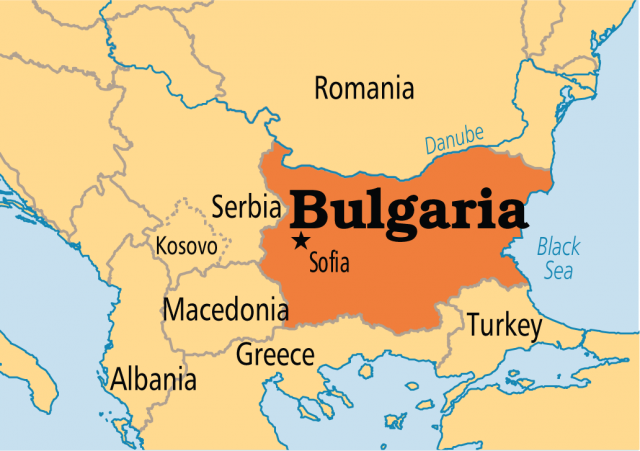Bulgaria
Area 42,900 square mi (111,910 square km)
Population 7.226 million 2014
Capital Sofia
Highest Point 9,596 ft (2,925 m)
Lowest Point 0 m
GDP $55.73 billion 2014
Primary Natural Resources bauxite, coal, copper, lead, timber.
BULGARIA IS ONE OF 10 countries in the Balkan Peninsula in southeastern Europe. The peninsula is a mountainous region with river systems flowing in all directions. As a land bridge between Europe and Asia, the Balkans witnessed a long history of warfare and territorial struggle. A number of conquerors in past centuries have exercised control over the region. Once a Roman province, the Balkans later became part of the Byzantine Empire, and still later came under the control of the Ottoman Turks. Bulgaria, formally named the Republic of Bulgaria and known as the People's Republic of Bulgaria when the Soviet Union dominated Eastern Europe (1946–90), is a heavily mountainous country, with its eastern border on the BLACK SEA, and is bounded on the north by ROMANIA, on the west by SERBIA AND MONTENEGRO (formerly the Federal Republic of Yugoslavia), and on the south by TURKEY and GREECE.

Bulgaria has a significant agricultural base in addition to a varied array of mineral resources from mining. Both industrial and agricultural activity increased dramatically during the time Bulgaria was a satellite of the Soviet Union. Two of the leading industrial centers are Varna and Burgas, both on the Black Sea coast. With the rise of industry, Bulgaria has experienced its share of environmental degradation. Rivers are polluted from the discharge of heavy metals, nitrates, and other industrial wastes, as well as raw sewage in some regions. Air pollution from industrial discharges and automobile exhausts has contributed to the presence of acid rain and subsequent widespread deforestation. The country is working to alleviate these environmental problems in part from funds received in the 1990s from the European Community.
A 2004 program has the Danube Regional Project working in close partnership with the International Commission for the Protection of the Danube River on identifying and remedying environmental problems in that world-famous river. The work by these organizations, is expected to expand to Romania, CROATIA, Serbia and Montenegro, and BOSNIA AND HERZEGOVINA, all of which are, along with Bulgaria, in the DANUBE RIVER basin. Bulgaria signed the Kyoto Protocol and is a member country of a number of other international environmental agreements. Bulgaria joined the NORTH ATLANTIC TREATY ORGANIZATION (NATO) and is expected to become a member of the EUROPEAN UNION (EU).
The population of Bulgaria reached its highest total in the mid-1980s at nearly 9 million. Since that time, the population has steadily decreased due to the emigration of large numbers of Turks and ethnic Bulgarians and several years in which the death rate has surpassed the birth rate. Estimates for mid-2004 indicate a birth rate in Bulgaria of 9 per 1,000 people in the country and a death rate of 15 per 1,000. Bulgaria's rate of natural increase (the difference between birth and death rates) in percentage form is -0.6. Recent estimates of regional and country populations for 2050 suggest that Bulgaria will experience the highest percentage loss of any country in the world. Its total population in that year is predicted to be approximately 5 million, a 44 percent decline from its high point of 9 million in the mid-1980s. In fact, all of the countries in Eastern Europe are predicted to decline in population by 2050, and the whole of Europe's population will drop from 728 million in 2004 to 668 million in 2050. All other major world regions are expected to increase in population over this same period.